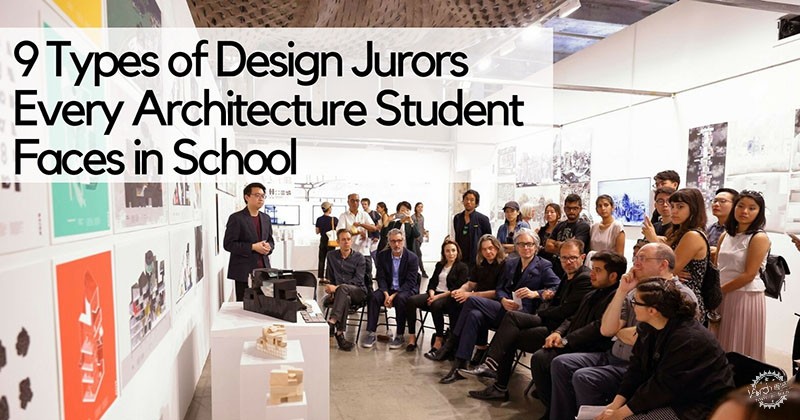
每一个建筑学生在学校可能遇到的9种类型的评审专家
9 Types of Design Juror Every Architecture Student Faces in School
由专筑网缕夕,韩平编译
公开评图这事儿俨然是建筑学院的家常便饭了。然而,评图成绩的高低主要掌握在审查学生工作的评审专家的手中。虽然建筑学是一个跨学科的综合性学科,但大多数评审专家都只是专长于某一领域。这使得设计评审团成为不可预测的事情;学生不仅仅要通宵熬夜为了应对他们的突发奇想,而且还要警惕,以确保他们能够处理评审专家可能扔给他们的任何问题。
但是,这比说起来容易一些。作为一名学生,为自己的作品辩护,如果不认同评审专家的批评,恰巧这个人又是小家子气的,那可能弊大于利。同样,虽说你的设计方案可能会为社会产生积极影响,但是这很难用来打动评审专家。能够正确识别评审专家的学术或情感倾向可以大大有助于学生在战略上展示他们的工作,从而确保他们充分获得评审专家的意见反馈。以下是每个建筑学生在学校某些时候可能面临的9种设计评审员:
Design juries undoubtedly form the very foundation of architecture school. Their success or failure, however, largely lies in the hands of the jurors who are assigned to review student work. While architecture is an inter-disciplinary subject with wide-ranging consequences, most jurors are specialists in a singular sub-field. This makes design juries a terrifyingly unpredictable affair; students don’t just battle against their nerves and sleep-deprivation, but are also required to be on their toes to ensure that they can handle anything that the jurors might throw at them.
However, this is easier said than done. As a student, defending your work against criticism from an easily-offended know-it-all juror will probably do you more harm than good. Similarly, it’s hard to impress a building services expert by harping on about the probable positive sociological impacts of your design proposal. Being able to correctly identify the academic or emotive leanings of a juror can go a long way in helping students present their work strategically, thus ensuring that they make the most of their jury experience. Here’s a compilation of nine types of design jurors every architecture student will probably face at some point in school:

Image via pxhere (public domain)
1.实用主义者
最有可能说的是,“我不在乎设计花园,给我看你的浴室布局”,实用主义者倾向于深入考虑建筑施工的实际方面。不过,他们不会单单停留在洗手间的布局,从停车和结构布局到管道和HVAC细节,一切都是公平的游戏。所有革命性的想法 - 一旦这些评审专家开始质疑他们背后的建筑技术,就会认为垂直花园,花式参数化的编程,护墙等都是不切实际的。
1. The Pragmatist
Most likely to say things like, “I don’t care about the sculpture garden, show me your bathroom layout,” the Pragmatists tend to deeply consider the practical aspects of building construction. They won’t stop at toilets, however; everything from parking and structural layouts to plumbing and HVAC details are fair game. All your revolutionary ideas—think vertical gardens, fancy parametric forms, earth-berms—will most likely be discredited once these jurors start to question the building technology behind them.

Image via pxhere (public domain)
2.理论主义者
这些是爱读书、画画、聊天的评审专家。事实上,你会发现,一旦他们开始说话,他们就不能停止。在这个过程中,你可能会发现他们的关注点不在你的作品上。就像“你的设计语言是如何体现伊东丰雄的作品风格, 但太过于衍生而不具有后果。”理论主义者也是最有可能要求并注意到这个“概念”的基本设计元素的人。
2. The Theorist
These are the jurors who love to read. And write. And paint. And of course, talk. In fact, you’ll find that once they start speaking, they can’t stop. In the process, you’ll probably discover things about your work that you never knew of. Like how “your design vocabulary references the work of Toyo Ito but is too derivative to be of consequence.” The Theorists are also the ones most likely to ask for and pay heed to that fundamental design element called the “concept.”

Image via pxhere (public domain)
3.社会活动家
建筑有权力影响社区,改变社会进程吗?嗯,是!这些评审专家坚信会这样。他们很可能在评论中至少提到一次“高档化”一词。他们将特别放大你的场地分析和环境调查工作; 对你的设计方案所带来的影响也将受到严格的评估。你也会发现他们说:“你不觉得售票给公园的使用带来障碍吗?”
3. The Social Activist
Does architecture have the power to influence communities and alter the course of society? Well, yes! These jurors firmly believe that it does. They are highly likely to mention the term “gentrification” at least once in their critique. Your site analysis and context survey work will be viewed under a microscope; their impact on your design proposal will be judged harshly as well. You’ll also find them saying things like: “Don’t you think ticketing introduces a barrier to the use of that park?”

Image via pxhere (public domain)
4.社会艺术家
如果你曾经在评审团会议中工程量清单,你可能会遇到这种类型。货币在这些评审专家的世界中至高无上——他们一般都有房地产或房地产开发的背景——质量在数量上起了第二位。这些是评审专家,最有可能专注于你建议中的地区声明和你的规划策略背后的理由——参考FSI,流线图和楼层使用效率来思考建立区域。你会发现他们说:“你为什么认为你需要一个五米宽的楼梯?这不是公共建筑!”
4. The Economist
If you’ve ever been asked for the bill of quantities in a jury session, you’ve probably come across this type. Money reigns supreme in these jurors’ world—they generally have a background in real estate or property development—where quality plays second fiddle to quantity. These are the jurors who are most likely to focus on your proposal’s area statement and the rationale behind your planning strategy—think built-up area in reference to FSI, circulation diagrams, and floor plate efficiency. You’ll find them saying things like: “Why do you think you need a five meter-wide staircase? This is not a public building!”

Image via pxhere (public domain)
5.设计师
这些评审专家看起来比你的工作更激动,在评审的时候会尽可能多地讨论你的工作——尽管表达了自己的观点,他们还是非常热情地想法重新设计你的设计。他们提出了一个独特的挑战:你需要大胆探索未知的可能性但又要保持个人风格。所以你不要轻易冒犯这些评审专家。
5. The Designer
Seemingly more excited about your work than you are, these jurors will discuss your work at length while offering—with almost forceful enthusiasm—ideas to rework your design, albeit to reflect their own perspectives. They present a unique challenge: you’ll need to walk a tightrope to simultaneously ensure that your work retains your signature and that you don’t offend these jurors.

Image via pxhere (public domain)
6.野蛮人
这些野蛮人可能是你最糟糕的噩梦,因为他们有潜力彻底破坏你的评审和伤害你的自尊心。他们渴望被注意到,并且会经常打断你的演讲,提出他们的批评。最有可能将你的作品撕开,甚至打烂你的模型,这样一来,这些评审专家似乎喜欢把学生置于一旁,那其实不用害怕发生人身攻击。
6.The Savage
These brutes are your worst nightmare for they have the potential to completely wreck your jury... and your self-esteem. They crave attention and will make it a point to interrupt your presentation frequently to offer their critique. Most likely to tear your sheets apart, or even break your models down, to make a point, these jurors seem to enjoy putting people down and won’t shy away from making personal attacks.

Image via pxhere (public domain)
7.著名人物
有时候,你的学校掀起一场政变,并邀请一位著名的建筑师出现评审会议。通常情况下,这些评审专家最终引起了非常高的关注,似乎没有人会关心评审团了。大多数学生为了追星都不能好好的完成他们的作品演讲。在这个茫然的状态下,任何来自他们的批评学生都不会有意见。然而,从这个经验中可以看出,肯定是积极的——你的Instagram 肯定会变得非常红火,因为来自世界各地的建筑学生,都将围攻你评审时候的照片,说着:“我的天!你一定被骂惨了!#sojealous”
7. The Famous One
Sometimes your school pulls off a coup and gets a famous architect to show up for a jury session. More often than not, these jurors end up attracting so much attention that no one seems to care about the jury anymore. Most students are star-struck to the point where they can’t put two words together in their presentations. In this dazed state, any critique that comes their way isn’t processed either. However, there is a definite positive that comes out of this experience—your Instagram is sure to become one hundred times cooler as architecture students from around the world mob your jury selfies to say things like: “OMG! You must have died! #sojealous”

Image via pxhere (public domain)
8.挑事儿的人
这些评审专家通常是评审团小组中最年轻的成员,并展示了重点关注最无关紧要的诀窍。实质性的建筑问题占据次要地位,这些评审专家评论图面颜色、渲染技术和图形组合。你会发现他们说:“你图纸上的指北针在哪里?或者如果你有时间的话,我建议你重新排列你的图纸,使其更好的叙述。”但是像这样的评论可能意味着这些评审专家的学业实力或经验的严重缺乏,也可能意味着你的工作是无关紧要的,因为评审专家找不到任何值得评论的东西。
8. The Pea-Brain
These jurors are usually the youngest members of the jury panel and display a knack for focusing on the most immaterial of elements. Substantial architectural matters take the backseat while these jurors comment on color palette, rendering techniques, and graphical composition. You’ll find them saying things like, “Where is the North symbol on your plan drawing?” or if you’re lucky, “I recommend you re-order your sheets to make for a better narrative.” But while comments like these could signal a significant lack of academic prowess—or experience—on the part of these jurors, it could also mean that your work is so inconsequential that the juror can’t find anything worthwhile to comment on.

Image via pxhere (public domain)
9.沉默的杀手
这些评审专家大多是具有荣誉地位的老年教授,已经看到并听到了这一切,但都很难以打动他们。在整个演讲过程中,为了不浪费口水,他们倾向于保持沉默,并且在进行任务评估之前,要将学生置于虚假的安全感中,直到最后才开始进行杀戮。如果他们跟你分享实质性的东西,你要仔细听耐心地听。虽然他们的批评可能不会对你目前的工作具体,但它将永远给你一些反思的东西。
9. The Silent Killer
Mostly age-old professors with emeritus status, these jurors have seen and heard it all and are very hard to impress. They tend to hold their tongue, for lack of energy or will, throughout the course of the presentation and lull you into a false sense of security before going in for the kill during the assignment of grades. If they do choose to grace you with their pearls of wisdom, listen carefully and patiently. While their critique might not be specific to your current work, it will invariably give you something to reflect on in the future.
出处:本文译自www.archdaily.com/,转载请注明出处。
|
|
